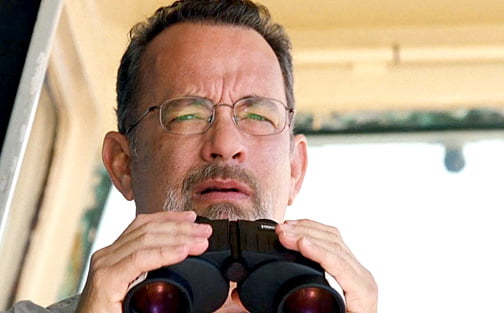It’s always tricky bringing real events to the screen. Even good movies like Ben Affleck’s 2012 “Argo” can veer toward making one side into the good guys and everyone else into the screaming hoards of evil. Director Paul Greengrass’ new film “Captain Phillips” doesn’t make that mistake.
Based on the true story of the cargo ship Maersk Alabama that was hijacked off the Somali coast in 2009, Greengrass has been even-handed in his treatment of the captain, played with Jimmy Stewart stalwartness by Tom Hanks, and the Somali pirates who board his ship.
The movie opens with Phillips leaving his New England home to join his container ship as it begins its voyage through pirate-infested waters around the horn of Africa. A seasoned veteran, Phillips is well aware of the dangers that could lie just over the horizon and keeps his crew on alert in case of an emergency. While Phillips gazes grimly at his charts, a group of dirt poor villagers in Somalia are given orders by their warlord masters to take to their nearly derelict boats and go fishing for ships to hijack. Chief among them is Muse, played with mesmerizing intensity by acting novice Barkhad Abdi. Muse is a former fisherman caught between competing cadres of warlords whose only language is violence. Muse is as much a slave as any on a pre-Civil War plantation, trapped between death and despair, and forced into piracy in order to survive.
With him in his boat are three other men as desperate as he is: Bilal, a man from another village and thus mistrusted, Najee, the pilot, and teen-aged Elmi. Greengrass understands that these are not bad men but men driven to the edge by poverty and violence. Commercial fishing fleets have stripped Somali waters of fish and piracy seems the only option for locals caught between starvation and the guns of the warlords.
There is a David and Goliath aspect to the story with the tiny open boat and its four armed pirates filmed starkly against the enormity of the container vessel they manage to board. Muse doesn’t want violence. “No Al-Qaeda here,” he tells Captain Phillips, “just business.”
High on khat, a botanical amphetamine, the pirates want to hold the ship and its crew for ransom but Phillips has hidden his men deep in the ship and in the pirates’ frantic search for them things fall apart quickly.
Muse’s mother ship has disappeared and the U.S. Navy is on the way. His own boat has been lost and his only choice is to take the lifeboat from the Alabama keeping Phillips with him as hostage. Hanks works tirelessly to give Phillips a heightened resourcefulness, always looking for a chance to better his situation or that of his men. His emotional duel with Muse as the massive power of the U.S. Navy closes in is fascinating. Phillips can’t understand why Muse doesn’t just surrender.
“They can’t let you win,” he tells the pirate. But Muse has come too far to turn back. The Somali actors bring a taut authenticity to their parts, not the least because they understand the men they are playing and, in having chosen the dark side, these pirates make us understand, too, just what that means.
See you at the movies!

